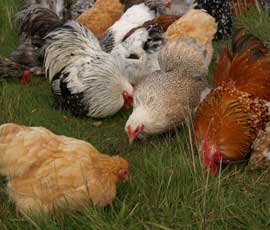Chicken producers warned over worms risk

Small-scale chicken keepers are being urged not to skimp on worm treatments this spring, despite the tough economic climate.
“Most chickens will reach their peak egg production in the spring months, but unfortunately, some birds won’t live up to expectations due to parasitic worms,” says a statement from animal health company Elanco. “Any savings made by avoiding the use of wormers could be a false economy.”
Worm development speeds up as environmental temperatures hit about 10C, according to Elanco, and in some parts of the country that can mean the parasite lifecycles can be completed early in the year.
Parasitic worm eggs are also susceptible to drying out, but wet muddy conditions commonly seen in spring help them survive for longer, presenting an increased risk.
“Unless birds are being treated regularly, they can pick up these worm eggs directly from the ground or via infected insects and earthworms. As parasitic worms can have adverse effects, it is much better to treat about four times a year, with spring being one of the most important treatment periods.”
Without regular treatments, birds can host a higher burden of worms, contaminating the chicken run with even more worm eggs and making it much harder to control the infection.
Elanco supplies its Flubenvet® 1 % Medicated Premixture in 60g pots – enough to treat about 20 chickens. Throughout the seven-day in-feed treatment, the eggs produced can continue to be consumed.
* Look out for more detailed analysis of the worm threat in our Technically Speaking feature in the April issue of Poultry World. Subscribe now to secure your copy.
